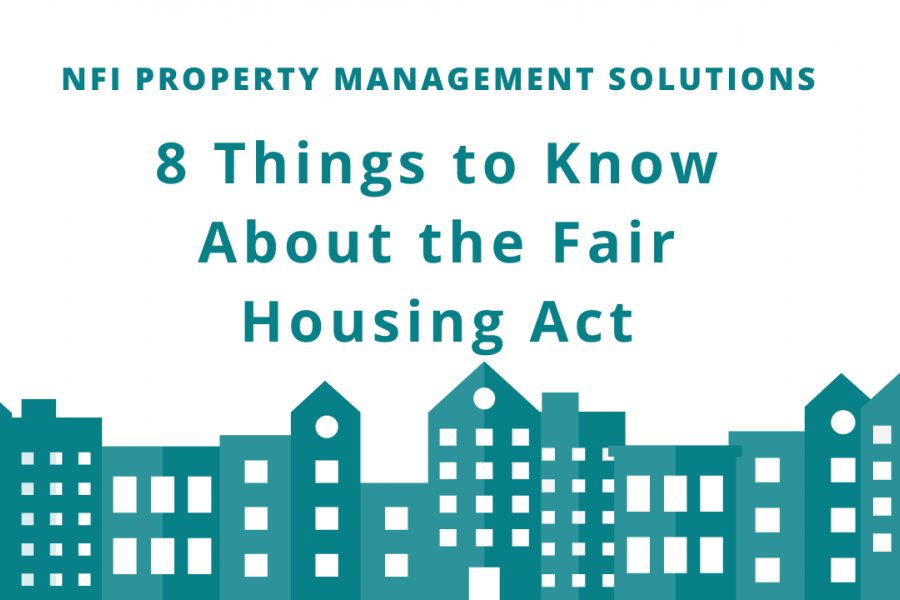
- Important Aspects of the Fair Housing Act
- Protected Classes Under the Fair Housing Act
- Additional Protected Classes
- Review Your State and Local Fair Housing Laws
- Discrimination Can Take Many Forms
- Reasonable Accommodations for Disabled Tenants
- Retaliation is Prohibited
- Advertising Your Rental Property
- Tenant Screening and Application Processes
- Occupancy Standards
- Education and Training is Essential
- Bottom Line
Understanding the laws that govern rental housing is a key part of managing properties successfully. One of the most important laws landlords need to be familiar with is the Fair Housing Act.
This federal law, enacted in 1968, ensures that individuals have the right to obtain housing without facing discrimination. If you're renting out properties, it's crucial to know what the Fair Housing Act covers and how it affects your role as a landlord.
NFI Property Management Solutions has put together this guide to help landlords navigate the main aspects of the Fair Housing Act. By having a clear understanding of the law, landlords can avoid legal issues and create a fair and welcoming environment for tenants.
Important Aspects of the Fair Housing Act
Protected Classes Under the Fair Housing Act
The Fair Housing Act prevents discrimination against individuals based on specific traits, referred to as protected classes. These protected categories include race, color, religion, sex, national origin, familial status, and disability.
This means that landlords cannot treat potential or current tenants differently based on these factors. For example, you cannot refuse to rent to someone because they have children (familial status) or because of their religious beliefs. Understanding these protections is essential to avoiding discriminatory practices and ensuring that all tenants have equal opportunities.
Additional Protected Classes
While the Fair Housing Act establishes these federal protected classes, it's important to note that some states and local jurisdictions have additional protections in place.

These might include protections based on sexual orientation, gender identity, marital status, age, source of income (such as housing vouchers), or military status. Be sure to familiarize yourself with your state and local laws to ensure you are compliant.
Review Your State and Local Fair Housing Laws
In addition to following federal law, landlords must also comply with state and local fair housing regulations. These laws can vary significantly from one location to another, so it's crucial to stay informed about the specific requirements where your rental properties are located.
Keeping up with these laws will help you avoid legal trouble and ensure that your rental practices are fair and equitable for all tenants.
Discrimination Can Take Many Forms
Discrimination under the Fair Housing Act doesn’t always look like an outright refusal to rent to someone. It may also manifest in less obvious ways. For example, advertising a rental unit with language like “perfect for singles” or “no children allowed” can be considered discriminatory against families.
Similarly, setting different rental terms or fees based on a tenant's protected class, like charging higher rent to someone of a certain nationality, is a violation of the law. It's important to review your rental practices, policies, and advertising to ensure they are free of bias.
Reasonable Accommodations for Disabled Tenants
Landlords are required by the Fair Housing Act to make reasonable accommodations for tenants with disabilities. Allowing a service animal in a rental that often has a no-pet policy or permitting a renter to put grab bars in the restroom are two examples of this.

The key is that the accommodation must be reasonable, meaning it should not place an undue financial or administrative burden on the landlord. Refusing to make reasonable adjustments for a disabled tenant can be considered discriminatory under the law.
Retaliation is Prohibited
Landlords are prohibited from retaliating against tenants who assert their rights under the Fair Housing Act. This means if a tenant files a complaint about housing discrimination, the landlord cannot evict them, raise their rent, or take other negative actions as a form of punishment.
Retaliation is illegal and can lead to serious legal consequences. It’s important to handle tenant concerns professionally and within the bounds of the law, even if you feel a complaint is unfounded.
Advertising Your Rental Property
How you advertise your rental property matters under the Fair Housing Act. The language and images used in a listing should be neutral and not suggest a preference for or against any of the protected classes. Avoid using terms like “perfect for professionals” or “ideal for families,” which could imply that you prefer certain types of tenants.
Even unintentional language that seems harmless can be viewed as discriminatory. Stick to describing the features of the property itself and the amenities that might appeal to a wide range of people.
Tenant Screening and Application Processes
The tenant screening process is another area where landlords need to be careful. The Fair Housing Act prohibits using different screening standards based on a tenant’s race, religion, or any other protected characteristic.

All applicants must be treated equally throughout the process, from reviewing applications to conducting background and credit checks. Make sure your screening criteria are consistent and apply to all applicants to avoid any perception of discrimination.
Occupancy Standards
While landlords can set reasonable occupancy standards, these rules must not be discriminatory. For instance, setting a strict one-person-per-bedroom rule may be seen as discriminatory against families with children.
The U.S. Department of Housing and Urban Development (HUD) generally allows two people per bedroom, but this can vary based on local laws and the size of the bedrooms. Before setting occupancy standards, it’s a good idea to check local regulations and ensure your rules are reasonable and not overly restrictive.
Education and Training is Essential
Keeping up with fair housing laws is not just about avoiding lawsuits; it’s about creating a fair and respectful environment for all tenants. As a landlord, it’s important to educate yourself and your property management staff on the Fair Housing Act.
Regular training and staying informed about any changes to the law can help ensure compliance. Many organizations, including HUD and local housing authorities, offer resources and training to help landlords understand their responsibilities under the law.
Bottom Line
The Fair Housing Act plays a crucial role in protecting tenants from discrimination and ensuring they have equal access to housing. As a landlord, it’s important to understand the protected classes, avoid discriminatory practices, provide reasonable accommodations, and handle tenant issues professionally.
Taking the time to ensure your rental practices align with the Fair Housing Act can help you maintain a fair and compliant rental business. At NFI Property Management Solutions, we understand the complexities of the Fair Housing Act and how it impacts your rental operations.
Our team is dedicated to helping landlords stay compliant while maximizing the success of their rental properties. Whether you need assistance with tenant screening, setting rental policies, or managing accommodations for tenants with disabilities, we’re here to help.
Contact NFI Property Management Solutions today to learn more about how we can support you in creating a fair and successful rental business.
Disclaimer: Please note that the information provided in this blog is intended for general guidance and should not be considered as a replacement for professional legal advice. It is important to be aware that laws pertaining to property management may change, rendering this information outdated by the time you read it.